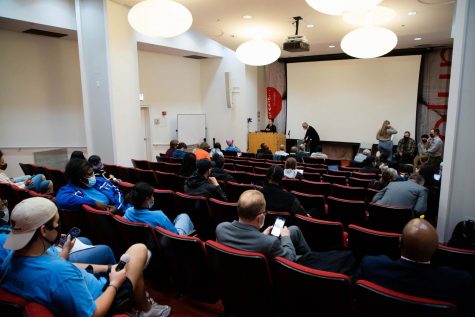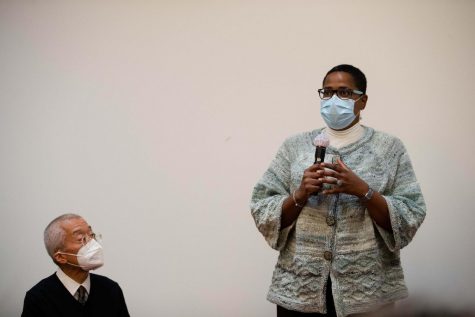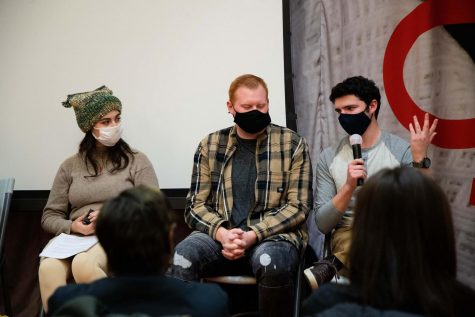‘Let’s Chat’ with Dr. Kim yields questions about institutional racism, COVID-19, potential staff strike
October 29, 2021

Bertram Rodgers, a senior film and television major, asked President and CEO Dr. Kwang-Wu Kim directly how he will address institutional racism at Columbia, in the first in-person, public Q&A with students since the start of the pandemic.
In response to Rodgers, Kim said, “My position as president of the college is that Columbia College Chicago, like all places of American higher education, is riddled with the residue and the reality of structural racism.”
Kim said he feels the school is still at an early stage of making progress toward its diversity initiatives. He added that the college’s Antiracism Transformation Team will officially begin its work at the end of the Fall 2021 semester.
“We exist to educate. … I want you to know that we are working like crazy to bring about change,” Kim said. “These things are very complicated, but we are very aware of them. … We are still at an early-mid stage of making progress, and we are trying to push that. … We don’t want to be a school that talks about diversity; we want to demonstrate diversity.”
“I am concerned about the oppressed. I am concerned about the underrepresented,” Rodgers said to the Chronicle, in response to his exchange with Kim. “So if I can do something with what I’ve been given, then my living is not in vain. I am going to continue to do everything I can to make sure that the [Columbia] office lives up to its duty, which is to ensure diversity, equity and inclusion.”
The Q&A was held Oct. 26 at 600 S. Michigan Ave., in a hybrid format, hosted by Columbia’s Student Government Association, as a way for students’ voices to be heard by the administration.
During the first half of the session, members of the SGA board asked pre-submitted questions from students, including questions regarding Columbia’s current financial strains, having both first- and second-year students on campus for the first time, the possibility of a staff strike and how students should navigate academics if they are sick.
In response to the inquiries about the potential for a staff strike, Kim said the staff union and the school are at a stage of “exchanging economic proposals” in their negotiations and said the union has not shared the full story with the Chronicle, regarding its conversations with the college.
When asked if the potential strike would impact students, Kim brought up previous strikes and said the school has never had to cancel classes because of a strike.
“I don’t want any of our students to think that there’s the possibility of everything coming to a halt,” Kim said. “Even the staff doesn’t want this to happen, because they are committed to providing students with the best quality experience. It’s a little tense, but this is normal.”

There was a question regarding the possibility of tuition rates increasing, in which Kim referenced the school’s financial strains and how enrollment impacts this.
Going into 2019, the board of trustees approved a five-year plan that would help them grow enrollment. The plan approved $35 million in deficit spending over a five-year period.
Kim said the deficit money in 2019 was spent mainly on increasing spending on scholarships for students.
“What COVID-19 has done for us [is] it’s added much more pressure on scholarship money, because families have suffered a great deal of financial hardship,” Kim said. “The college wanted to step forward and make this place possible for a lot of families.”
Kim said 85% of the money used to operate the college, including scholarship money, salaries and investments, comes from tuition.
Additionally, the school has seen a drop in enrollment and in residence hall participation.
“We had an amazing year in 2019,” Kim said. “We went from an incoming freshman class of about 1,300 students to an incoming class in 2019 of over 1,700 students, almost 1,750 students.”
“Then, of course COVID-19 hit,” Kim continued. “So on a number of levels we suddenly found ourselves with the planned deficit spending and now all this new unexpected deficit spending.”

Despite the school being challenged, Kim said he is remaining hopeful.
“We have a plan, and we continue to believe that we are going to grow,” Kim said “[But] not quite as quickly as we had hoped.”
Kim said the administration will announce updates on tuition by mid-November.
In addition to Kim, various Columbia administrators attended the event, including Chief of Staff Laurent Pernot, Senior Vice President and Provost Marcella David and Vice President of Student Affairs Sharon Wilson-Taylor.
Olivia Porto, SGA vice president and a junior acting major, asked about the protocol for students missing classes due to sickness after she saw a grade drop in nearly all of her classes after being sick for a week.
“I contacted my professors and asked if they need any documentation or anything, and my grades were still down,” Porto said. “Only after contacting Student Relations, my grades went back up.”
To answer these questions, Kim welcomed David to the stage.
“We have been sending messages to faculty encouraging people to be flexible and to not have hard-fast rules to help students keep up,” David said. “There are strategies out there; I encourage you to reach out to your professors about alternatives to make up the work and get back on track.”
Kim encouraged students to speak up when they feel something is wrong, saying Columbia is a “safe” campus regarding COVID-19 and vaccination status.
“We can’t fix the things we don’t know about in spite of every effort … things have to be brought to light for action to take place,” Kim said. “Please take that seriously.”







